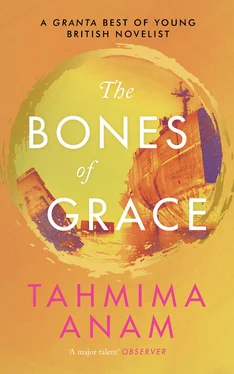In the morning I resolved to tell him everything, starting with the music and Sanders and the way I’d felt the night before we were married and how I hated being called ‘Bou-ma’, daughter-in-law, by Dolly, as if she had brought home an injured animal from the zoo. But I didn’t. I ate white bread toast and scrambled eggs. I went to lunch with Rashid at the golf club and watched him practise his swing, a solid figure against the gently undulating blanket of green.
You had said something to me about having courage. About my will. But I was nothing but a coward. Just looking at Rashid, the way he twisted his hip as he raised the club, made me afraid.
One day my clothes and books and laptop — the things I’d left behind at the apartment — appeared at Rashid’s house. He must have asked Joshim to pack everything up. I didn’t ask him about it and he didn’t volunteer anything. Among my things I found a T-shirt that belonged to you. ‘Had you left it for me to say, I am still here, I understand, I will be patient, I will wait’? Of course not. Joshim would have found it bunched up at the foot of the bed and he would have folded it into my bag. All the next day I walked around with VERMONT written across my chest.
It was a Friday morning, dull with rain. I was about to get dressed, had just peeled the covers off the bed, when Rashid appeared in front of me, wielding my laptop. He held it high in his hand and then threw it against the wall, making a bright, clapping sound.
When he started yelling, I raised myself off the bed and sat very still at the edge, my feet balanced on a chair (‘What is that fucking T-shirt you wear all the time, and that look on your face like someone just slapped you?’). He was pacing the room, and occasionally stopping and turning to look at me. I concentrated on a small square of marbled floor under my feet. He pulled out a cigarette from the drawer of his bedside table, lighting it with shaking fingers and inhaling deeply. ‘Don’t smoke,’ I whispered, and at this, the first words I had spoken, he shouted, ‘What the fuck?’ And I said, ‘Don’t smoke on my account. I mean, don’t punish yourself because of something I did.’
There was a knock on the door. ‘Breakfast!’ Dolly chimed. On Friday, everyone ate together in the dining room, Bulbul at the head of the table, French toast arriving hot from the kitchen. We looked at each other and called out, in unison, ‘Coming!’ Then Rashid, changing his mind, holding the cigarette behind his back, opened the door a crack, said, ‘Ma, Zubaida’s not feeling well, can you just send something up?’ and there was a brief exchange about my symptoms, whether a visit to the doctor was called for, a list of things I must do (the word ‘gargle’ was repeated), and then finally Rashid closed the door and came back inside. He opened a window, ushering in the sound of the rain hitting the thick leaves of the jackfruit tree that leaned against the eastern side of the house. For a moment I considered leaping out of that window and falling softly onto the grass below. Then, in answer to his question, I said, ‘He’s someone I met at Harvard.’ To which Rashid said, with a sadness that could only be whispered, ‘You already said that.’
It had come up before, when our engagement had been announced to the extended family. That I, having attended the elite college in New England, and then Harvard, would be more educated than Rashid. ‘More qualified’ is how people put it. But nothing had come of it — Dolly and Bulbul had mentioned it casually, and my parents had dismissed it, saying, how could this small thing matter when the children had known each other for years? Surely they would have discussed it and worked things out. But we hadn’t. What was there to say? How would such a conversation begin? Hey, I’m cleverer than you, what should we do about that? Should you read more books so you can know what I mean when I refer to Stephen Jay Gould’s Cerion snails? In retrospect, I wondered if we should have said something to each other. Perhaps Rashid should have read a few more books. Anna Karenina , at the very least. I remembered now how casually he had unpacked my boxes and put my books on the shelf in the study of our little suite, treating them as if they were all the same. My rare edition of Jane Eyre , for instance, with the lithographs, he had placed beside a paperback of his own, a Scandinavian thriller with the image of a white wolf on the cover. If I told him to read Anna Karenina now, he would get fifty pages in and say I was turning to Tolstoy for an excuse to cheat.
Rashid was saying something to me, but he was facing the open window and I couldn’t hear him. I was suddenly very tired. He tossed the cigarette from the window and turned to confront me again. He wanted, of course, to know the details. When and how. And why. There was a knock on the door, and a trolley was wheeled in with a jug of tangerine juice, a steel cloche, and a pot of tea. On a plate next to the teapot was a tiny pile of chopped-up ginger and a small dish of honey. The honey made me think of the mangrove, of that plastic bottle — what had you done with it? Rashid pulled up the cloche and asked me if I wanted something to eat. I shook my head. The smell of eggs made the bile rise in my throat. I knew I should keep talking, tell Rashid how sorry I was, tell him it was over, that I would never do something like that again. But I couldn’t bear to utter the words. I was emptied of will. Nothing happened. It was nothing.
‘Should I move out?’ I said finally.
This made him angry. ‘So like you,’ he said. ‘Running away when things get messy.’
I saw him battling with himself: on the one hand, giving himself licence to rage, on the other, measuring, calculating, bookending his anger. He came over and sat very close to me, and I saw his hands holding each other. I was suddenly filled with an old affection for him, the man who had been my childhood friend, and I leaned into him, and then the words, the things he wanted to hear all came pouring out, the sorrys, the desperate pleas for him to forgive me. All the time I felt you listening and your heart breaking, and now I was trying to tell a story, a maudlin, nonsensical story that was an explanation of what I had done and why.
We lay down together on the bed. Rashid pulled the sheet over our heads. A small amount of light came through and I could see the outline of the room, the heavy curtains framing the windows, the pair of Shakoor paintings, a present from my parents, on either side of the bathroom door. Oh, God, my parents. I would have to tell them. I turned around and buried my head in the pillow. I had ended up on Rashid’s side of the bed and I smelled his sleep smell. I could hear him breathing on the other side, and wondered if he was crying. But he wasn’t. I heard him get up and cross the room. At the door he turned around and said, ‘I’m joining my mother for breakfast.’ And as I heard the door closing behind him I realised he had been waiting for me to say I loved him, and that I hadn’t, not once.
About half an hour later he came back. He was holding the newspaper in his hand, and a bottle of cough syrup. I was on the bed where he’d left me. I had allowed my thoughts to drift back to that early moment on the beach when we climbed aboard Grace and you played the Steinway for the first time. I remembered the smell of the auditorium, already turning briny, and how you pierced the silence with your playing, as if it was the first sound in the history of the world. I might have slept, because when Rashid started talking it was difficult to open my eyes. He looked at me and sighed, long and deep, and sat down on one of the matching armchairs that faced the bed. ‘Did you tell your mother?’ I asked him.
Читать дальше












